 Petzlover
Petzlover Bergamasco is originated from Italy but Olde English Bulldogge is originated from United States. Bergamasco may grow 11 cm / 5 inches higher than Olde English Bulldogge. Both Bergamasco and Olde English Bulldogge are having almost same weight. Both Bergamasco and Olde English Bulldogge has almost same life span. Both Bergamasco and Olde English Bulldogge has same litter size. Bergamasco requires Moderate Maintenance. But Olde English Bulldogge requires Low Maintenance
Bergamasco is originated from Italy but Olde English Bulldogge is originated from United States. Bergamasco may grow 11 cm / 5 inches higher than Olde English Bulldogge. Both Bergamasco and Olde English Bulldogge are having almost same weight. Both Bergamasco and Olde English Bulldogge has almost same life span. Both Bergamasco and Olde English Bulldogge has same litter size. Bergamasco requires Moderate Maintenance. But Olde English Bulldogge requires Low Maintenance
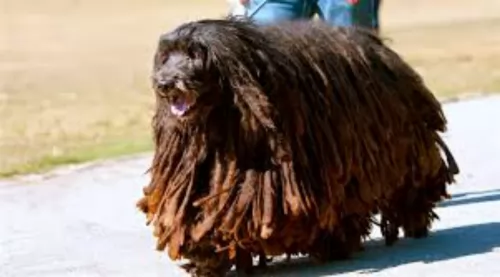 The Bergamasco comes from northern Italy. This medium sized sheepdog is of ancient origin. Known as an Italian sheep herding breed, his name actually comes from the town where he comes from - Bergamo.
The Bergamasco comes from northern Italy. This medium sized sheepdog is of ancient origin. Known as an Italian sheep herding breed, his name actually comes from the town where he comes from - Bergamo.
It was after World War II that there was danger that this breed would disappear as the need for herding and shepherding was diminishing. An Italian breeder, however, Dr. Maria Andreoli, stepped in to save the breed.
It was in 2015 that the American Kennel Club also changed the breed’s status from Miscellaneous to the Herding Group.
 The Bulldog in general has undergone quite a few changes over the years and the Olde English Bulldogge was developed as a designer breed in the United States.
The Bulldog in general has undergone quite a few changes over the years and the Olde English Bulldogge was developed as a designer breed in the United States.
The dog was developed by David Leavitt in 1971, who crossed the English Bulldog with a Pitbull, American Bulldog and Bull Mastiff. Leavitt wanted a dog that would be free of the breathing problems bulldogs battle with. He also wanted the dog to be more nimble, more agile and more healthier.
Crossing the Bulldog, Bullmastiff, American Pit Bull Terrier and the American Bulldog, he developed the Olde English Bulldogge. The dog isn’t recognized as a breed by the AKC.
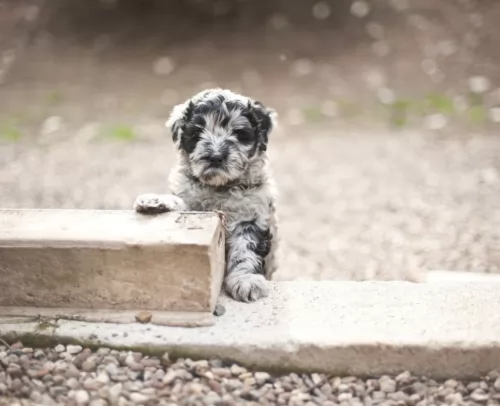 This medium sized sheepdog stands 54 – 62cm in height and weighs up to 38 kg as an adult. It is his coat which draws the most attention. It is of a coarse texture and actually greasy to the touch. It actually forms into strands or almost like dreadlocks from the top of the body, so that people agree he is one of shaggiest dog breeds there are.
This medium sized sheepdog stands 54 – 62cm in height and weighs up to 38 kg as an adult. It is his coat which draws the most attention. It is of a coarse texture and actually greasy to the touch. It actually forms into strands or almost like dreadlocks from the top of the body, so that people agree he is one of shaggiest dog breeds there are.
From age 1 on the coat starts to become woolly, and then the flocks start to form. As these clumps of hair appear, it will become necessary to separate them into smaller cords by hand to ensure attractive formation Brushing isn’t necessary but a big toothed comb can keep their hair ‘groomed’.
The colour of the coat is solid grey with patches of shades of grey and sometimes black. His dense, heavy coat makes it that he is suited to cooler climates. Because he is a herding dog, he wouldn’t do well in an apartment but would suit a home with a large garden.
He is intelligent and social but will need firm handling as he is a boisterous dog. He has a muscular yet compact body with a large head, long tail, high-set semi-drooping ears and large, gentle looking brown eyes. Although not instinctively aggressive, he makes an excellent watch dog with strong protective instincts to protect his human family.
He views new people into his circle with suspicion and wariness. He is good with kids and pets in the home and is playful and energetic.
 Olde English Bulldogges are purebred dogs. They are big boned, solid and muscular. They are medium sized dogs and stand at roughly between 40 and 51cm and weigh between 22 and 36kg.
Olde English Bulldogges are purebred dogs. They are big boned, solid and muscular. They are medium sized dogs and stand at roughly between 40 and 51cm and weigh between 22 and 36kg.
They have big, broad head and a furrowed face. The ears are fairly small and are semi-erect, semi-floppy. The neck is thick and powerful, the legs short and stocky. The coat is short and is usually white and tan, white and grey, brindle or solid colors of fawn, red and black.
The Olde English Bulldogge is a healthier, more active, athletic dog. It was given this name to differentiate it from the modern English Bulldog.
Olde English Bulldogges are gentle and good natured, snorting around and just dying for his human family to tickle his tummy.
He has an easy-to-please temperament and being intelligent, he will respond well to training and socialization.
He is adaptable and can settle into life in the city or in the countryside. He has strength and stamina but will do better with a walk as opposed to running next to you as you cycle - this will exhaust him and be unhealthy for him.
The Olde English Bulldogge is a sweet, friendly, confident but gentle dog known for his strength and stamina. They are friendly and outgoing, even being social and friendly around strangers. They get on well with children and pets in the home too and will make a wonderful pet.
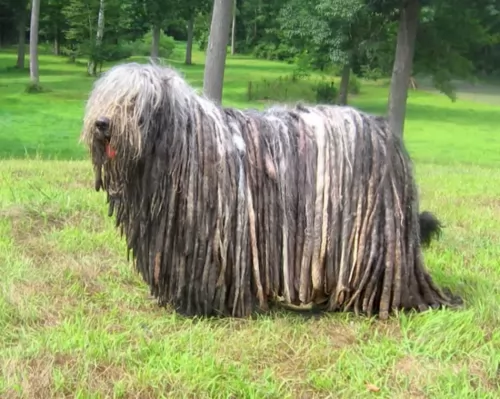 This is a working dog so they are naturally alert. He is also intelligent and independent and this independence is seen with training as he doesn’t take easily to following instructions, becoming stubborn. You’ll certainly want to have your Bergamasco socialized and trained as he can be a boisterous dog, bounding with energy.
This is a working dog so they are naturally alert. He is also intelligent and independent and this independence is seen with training as he doesn’t take easily to following instructions, becoming stubborn. You’ll certainly want to have your Bergamasco socialized and trained as he can be a boisterous dog, bounding with energy.
This is a dog that will need to be kept busy and provided with plenty of activities so that he remains happy, playful and relaxed.
Lively and intelligent, these dogs also form strong bonds with their owners and get on well with the children in the home. He will take well to country life as opposed to living in the city.
 The Olde English Bulldogge is a gentle, sweet dog who just wants to be a loved member of your home. He wants to please, so training and socialization will do him the world of good as then he becomes obedient and responds easily to some basic commands.
The Olde English Bulldogge is a gentle, sweet dog who just wants to be a loved member of your home. He wants to please, so training and socialization will do him the world of good as then he becomes obedient and responds easily to some basic commands.
He has a protective nature and will do what he can to guard and protect you. Such a wonderful 4-legged friend and companion deserves your unconditional love.
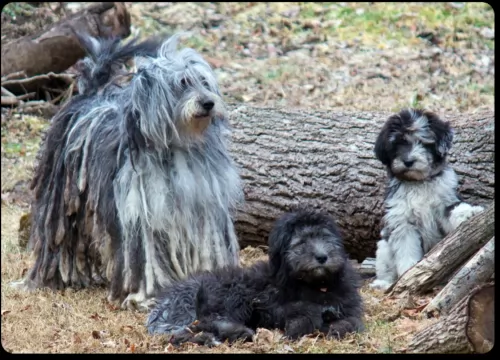 Your Bergamasco can live to be 13 to 15 years of age and he is considered to be a healthy breed. Nonetheless you want to be aware of health issues that are common to this breed
Your Bergamasco can live to be 13 to 15 years of age and he is considered to be a healthy breed. Nonetheless you want to be aware of health issues that are common to this breed
he is vulnerable to heat. He can die of heat exhaustion quicker than other breeds
keep an eye on him for hip dysplasia, progressive retinal atrophy and skin allergies
 The Olde English Bulldogge can live to be 14 years old if he is looked after well. These dogs are prone to some of the typical dog ailments there are and bloat is one.
The Olde English Bulldogge can live to be 14 years old if he is looked after well. These dogs are prone to some of the typical dog ailments there are and bloat is one.
This ailment is also known as Gastric Dilatation Volvulus, a life-threatening disease regarded as a medical emergency. The stomach can twist, cutting off blood flow to the heart. It occurs more often in deep-chested dogs and you will notice the swollen stomach.
These dogs are considered to have less health issues than other brachycephalic breeds but still you need to keep an eye on their breathing. In fact, David Leavitt, who developed the dog says that this particular mix of dog doesn’t have the undesired negative health aspects of the dog’s relatives such as hip issues, difficult births and brachycephalic syndrome. They are also far more tolerant to heat and cold that other bulldog types.
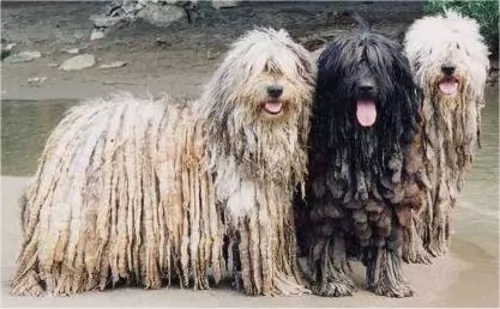 The Bergamasco isn’t a shedder but his coat will need to be combed once a week just to keep it in order. You don’t want to bath him too often, especially during the Winter as his coat takes a long time to dry. It isn’t recommended to shave a Bergamasco as the coat regulates the dogs temperature – keeping him warm and cold as the weather demands.
The Bergamasco isn’t a shedder but his coat will need to be combed once a week just to keep it in order. You don’t want to bath him too often, especially during the Winter as his coat takes a long time to dry. It isn’t recommended to shave a Bergamasco as the coat regulates the dogs temperature – keeping him warm and cold as the weather demands.
They thrive on a blend of kibble (dry) mixed with raw and-or moist food once or twice a day. Remember to include quality chicken, turkey, etc. mixed with some vegetables and rice into your dog’s diet. Ensure a constant supply of fresh water in an easily-cleanable bowl.
Balls and ropes are important for building muscle strength and burning energy. Remember your Bergamasco is a working breed and will need plenty of games and exercise.
 There are a number of things you can do to make sure your Old English Bulldogge settles down nicely into his new home.
There are a number of things you can do to make sure your Old English Bulldogge settles down nicely into his new home.
With his short coat, he isn’t described as being hypoallergenic, but the coat is looked upon as not triggering allergies as much as some of the other dog breeds. He will simply require a brush twice a week.
Make sure to take your 8 week old puppy to the vet to check him over and to start with his first vaccines to avoid him getting some of the life-threatening illnesses there are. He will also be de-wormed. Later on as an adult, he or she will need to be neutered or spayed to prevent puppies.
Never leave your dog in a car on a hot day. It can kill him. Rather leave him at home.
Feed your Olde English Bulldogge a balanced diet that provides him with the right amount of minerals and vitamins. The top ingredients of commercially manufactured pet food must be meat. You can add some home-made food into his kibble as a treat as well as some raw meat occasionally. Chopped up boiled chicken, brown rice or pasta and vegetables such as spinach, sweet potato and carrots will be excellent for him. You can also look at the possibility of giving your dog a supplement. Make sure he has a constant supply of fresh, cool water.